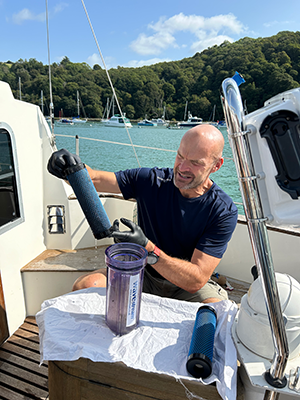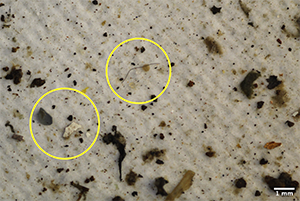
Preventing microplastic pollution
A study undertaken by E-A Earth Action* reveals that paint particles appear to be the largest source of microplastic leakage into the ocean and waterways. Accounting for more than half (58 per cent) of all microplastics, the report says paint particles outweigh all other sources of microplastic leakage, such as textile fibres and tyre dust.
Joao Matos de Sousa, Senior Programme Officer at the International Union for Conservation of Nature (IUCN) says: “The science has demonstrated the problem, now it is up to us to discover ways to restore our rivers and ocean.”
A simple and cost-effective solution to help prevent pollution of all sorts – not only paint chips but oil, diesel, micro plastics and fibres – is to fit a Wavestream bilge filter. Retailing at less than £150, Wavestream filters are quick and easy to fit inline between the bilge pump and water outlet. Whilst paint particles can enter the waterways from multiple sources, such as land run off, many boaters will be aware of the scraps of paint and varnish which often end up in the bilges, especially after any repair or maintenance work.

Monty Halls
Marine biologist and naturalist Monty Halls realised this after fitting a Wavestream bilge filter onto his sailing yacht. After six months use around Dartmouth and the South Coast, the filter was sent to a specialised microplastics laboratory for analysis. The findings revealed that a large number of paint particles and fibres had been caught by the filter. As well as paint particles, there were also red fibres, and a number of white, blue and black fibres which were hypothesised by the researchers to come from clothing and other fabrics onboard such as seat covers and bedding.
Paul Gullett, MD at Wave International, said: “Paint and resin particles are released from general wear and tear of using a boat, as well as when maintenance occurs and it’s inevitable that these will end up washing down into the bilges. By fitting a Wavestream bilge filters, boat owners can prevent this type of pollution going overboard.”
The analysis also identified dark coloured organic matter such as sludge and slime. Without having this filter in place, a large amount of microscopic paint particles, microplastics as well as microfibres, would have been emitted overboard into the marine environment.
Fitting a bilge filter is currently an environmental choice by boat owners, but recently manufacturers have been given clearer guidance that watercraft are to be constructed so as to prevent the accidental discharge of pollutants. The recently updated Endorsed Recommendation for Use (ERFU#94) which applies to the Recreational Craft Directive (RCD/EU) and Recreational Craft Regulations (RCR/UK) states that watercraft are to be constructed to ensure prevention of accidental discharge of pollutants such as oil and fuel overboard.
In additional, more areas worldwide are introducing legislation to enforce protection of marine areas. The Azores has just become the largest Marine Protected Area in the North Atlantic, creating a 300,000km² zone where limits on human activity that affects the natural environment are enforced. Other Marine Protected Areas include the areas around the UK, such as Lundy island, the Galapagos and areas of Antarctica as well as intertidal zones, estuaries and lakes worldwide. The Saudi Red Sea Authority has recently introduced a set of regulations which prohibits yachts from dumping, discharging or disposing of any pollutants resulting from ballast water, waste, liquid components and dissolution of anti-fouling materials.
 “In some protected areas, the legal limits on pollution levels reduce from 15 ppm (parts per million oil in water) to just 5ppm,” said Paul Gullett. “A single drop of diesel in half a litre of water is about 40ppm. Even a tiny trace of diesel or oil causes surface pollution – the ‘blueshine’ which is when oil or diesel can be seen on the water surface.”
“In some protected areas, the legal limits on pollution levels reduce from 15 ppm (parts per million oil in water) to just 5ppm,” said Paul Gullett. “A single drop of diesel in half a litre of water is about 40ppm. Even a tiny trace of diesel or oil causes surface pollution – the ‘blueshine’ which is when oil or diesel can be seen on the water surface.”
The Wavestream filters ensure that any traces of oil, as well as microfibres and microplastic particles are trapped within the cartridge, ensuring that only the highest worldwide standard of 5ppm is achieved. The filter can hold up to three times its own weight of oil, and depending on use, the Wavestream filter may only need changing once a year, and replacement filters cost around £25 + VAT. Wavestream bilge filters have been manufactured in the UK for 25 years, and meet the latest ERFU for RCD/RCR requirements and are Lloyds Type Approved certified.
The post Preventing microplastic pollution appeared first on All At Sea.
